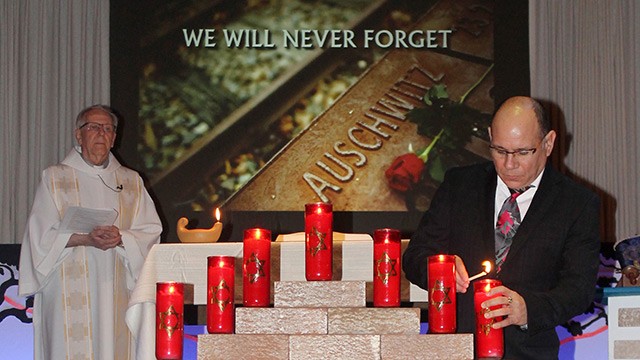Holy Family hosts Christian Holocaust commemoration

General
More than 400 packed Holy Family church in Montreal’s Little Italy for the 38th Christian Commemoration of the Shoah (Holocaust). The city is home to Canada’s oldest Jewish community; the nation’s first synagogue was established here in 1768.
Held April 30, at the conclusion of Holocaust Remembrance Week, the 90-minute Eucharistic celebration included the lighting of seven memorial candles and the recital of the traditional Jewish prayer for the departed, Kaddish, sung by Cantor Heather Batchelor.
Holy Family pastor John Baxter presided at the liturgy, assisted by Deacon Richard Brisebois; Rabbi Sherril Gilbert from Synagogue Dorshe Emet joined them for the commemoration service.
The Gospel reading for that Sunday described the disciples' unexpected encounter with a stranger on the road to Emmaus, whom the disciples invited to stay with them at the end of the day. Had they not extended that invitation, Fr. Baxter pointed out in his homily, they would not have encountered the risen Lord. "We must do the same to encounter the living God, our loving God," he proposed.
"Hidden child's" Story
Following the homily, Eva Kuper also focused on the theme of love in her poignant testimony as a "hidden child" and Holocaust survivor.
Born in Warsaw in 1940, just months after the German invasion, Eva narrowly escaped death several times during her first five years of life, all due to the selfless courage and sacrifice of her Jewish parents, a cousin, a kindly woman and a Franciscan nun. It was through the latter, Sr. Klara Jaroszynska, that Eva was protected for three years from the raging inhumanity that saw 12 million people butchered in concentration camps, among them six million Jews.
Reunited with her father after the war - her mother perished at Treblinka - the family emigrated when Eva was eight.
Wanting to be "just another Canadian kid," Eva did not actively seek information about her difficult childhood until 2005, when she made her first of several return trips to Poland.
To her astonishment, she discovered that Sr. Klara was still alive. Although Eva remembered neither her face nor her voice, she experienced an instant "emotional connection" once again in the arms of her 94-year-old protector. It was a life-changing moment for Eva. "It made me aware of the most precious gifts she had given me...not only the gift of life but also, the gift of love." (Read testimony here)
Eva's powerful witness was followed by the lighting of seven memorial candles. The Holocaust survivor lit the first candle, dedicated to the memory of all Jewish Holocaust victims.
Successive candles were lit by designated representatives in memory of: Jewish survivors; Holocaust victims; those persecuted because of difference (origin, culture, religion, etc.); righteous Gentiles (those who risked their lives to save others during the Holocaust); soldiers who liberated the camps; and finally, the millions for whom there is no one to mourn.
In a Jewish gesture of remembrance, about ten youth from the parish confirmation class placed memorial stones before each candle, signifying that future generations will continue the tradition of remembering.
The choir and musicians from Centre étudiant Benoît-Lacroix, affiliated with the Université de Montréal, led the assembly in Jewish and Christian song.
Christians & Jews in dialogue
The event was organized by the Christian-Jewish Dialogue of Montreal, which meets monthly and is comprised of eight Christian denominations and representatives of the major Jewish traditions in the city.
The dialogue was formally established in 1971, at the urging of Archbishop Paul Grégoire and Rabbi Langner, president of the Board of Jewish Ministers, for their clergy to meet and to collaborate.
The group soon became ecumenical and included lay members. In 1980, it organized the first Christian Commemoration of the Shoah, held at Christ Church Anglican Cathedral.
During the last 38 years, the commemoration has been held in different Montreal-area churches, both French- and English-language. It is usually incorporated into the regular worship service of the host church, Dialogue vice-president Jean Duhaime explained, "to make the memorial experience available to the widest group of people within their own faith context."
While Christian leaders in some Canadian cities attend Holocaust memorial observances organized by their fellow Jewish citizens, Montreal appears to be the only city that organizes a Christian commemoration of the Shoah, as far as Duhaime knows.
Fr. Raymond Lafontaine, Episcopal Vicar for the English-speaking Catholic community, lit the second candle. Mary Deros, the mayor of the Villeray borough where Holy Family is located, lit the sixth candle.
No provincial or federal representatives were present, although invitations had been sent.

Comment
0 Comment
Add new comment